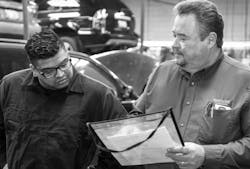Everywhere else, he’s known as Eric Cabrera. But at Tramcar Transmission Specialists, they call him Junior. A service advisor at the Chicago shop, he got the name from one of the technicians, who noticed Cabrera took after the owner, Cary Hajduk.
“I pretty much talk and act exactly like Cary,” Cabrera says. “Cary molded me to become the kind of worker I am. He’s like a father figure to me.”
“Junior Cabrera” exemplifies everything Hajduk strives to achieve with customers. His motto is “Win customers for life,” and that entails pleasing customers at all costs—from the moment they walk through the door, to updates throughout the repair process, to the moment the keys are handed back.
Cabrera, however, had a problem with “winning customers” when he first started at Tramcar. He was a natural salesman—which is how he obtained the job—but when it came to continuous customer service throughout the process and following repairs, he needed some work.
“It is far, far harder to attract a new customer than it is to keep an existing customer or get referrals from that existing customer,” Hajduk says. “And it took [Cabrera] some time to realize that.” Thanks to some mentoring, training and process improvements, Hajduk and Cabrera are now on the same wavelength when it comes to winning customers for life.
Tramcar Transmission Specialists
—
Location: Chicago
Size: 4,250 square feet
Staff: 5 (3 technicians, 1 service advisor, 1 owner)
Number of Lifts: 6
Average Monthly Car Count: 135
Annual Revenue: $650,000
The Backstory
Eight years ago, Cabrera auditioned for the service advisor role at Tramcar without even realizing it, when he sold Hajduk on a membership at Bally Total Fitness.
“He had a very good personality,” Hajduk says of Cabrera. “He was an outgoing individual. He was very persistent. Junior is very helpful, asks questions, and pushes for a sale. That’s what attracted me to him originally.”
Then the assistant manager at Bally, Cabrera was the gym’s top salesman. After a speech on how to live and eat healthier, he would sell you on the importance of working out. Membership after membership, Cabrera was proving why he had such a knack for getting people motivated and invested in the service he offered.
To Hajduk, this translated well to selling repair work and he offered to train Cabrera on the technical side of auto repair. Cabrera accepted a job offer from Hajduk seven years ago and became the new service advisor at Tramcar Transmission Specialists.
The Problem
Cabrera took the job because he was sold on Hajduk’s philosophy about repairing vehicles.
“This is people’s livelihood, how you transport your family, your kids, the whole nine yards,” Cabrera says. “So when you come into my facility, I’m the guy that’s going to calm you down and show you exactly how we can help you out and improve your situation.”
Selling repairs came naturally to Cabrera. A car aficionado, he could break down the repair process, how his technicians would diagnose the vehicle, and why you could trust Tramcar over other transmission shops in town.
But, as Hajduk soon realized, the good qualities Cabrera carried over from Bally came with some bad tendencies.
“I soon got the impression that once you got a membership [at Bally], that was it,” Hajduk says. “You didn’t care what happened to them after that, if they became happier, fitter people.”
So when it came to selling the repairs to customers? No problem. But when it came to updating the customers when a repair fell behind? He would balk. Dealing with a comeback customer? He would freeze up and refer them to Hajduk. Any stressful situation outside of selling repairs? He caved. And it showed.
“He was very high strung,” Hajduk says. “A lot of this stuff he would bring on himself by being so apprehensive under stress.”
The Solution
Hajduk deeply believed in Cabrera’s abilities as a salesman, so instead of firing him, Hajduk began mentoring his service advisor, offering key pieces of advice during Cabrera’s first three years that dramatically improved his communication with customers and increased sales:
“Don’t let the customer call you.” Beforehand, if Cabrera spoke with a customer before a vehicle was ready, it was because the customer contacted first, wondering about their vehicle’s status. Now, Cabrera has developed a system that segments an hour of his day for keeping customers updated daily on the repair timeline, notifying them before they get anxious and call the shop.
“Be specific.” When customers would inquire about their vehicles during Cabrera’s early years, he wouldn’t have the information at hand to keep them updated.
“[Customers] don’t want to hear, ‘We’re working on it.’ What does that mean?” Hajduk says. “Be specific: ‘Hey, we got the transmission rebuilt. We’re starting the installation now, which normally takes about two hours.’”
Being more informative with his updates entailed a combination of notetaking and improved communication with technicians. Cabrera now dedicates hours of his day to visiting the repair floor and getting updates on vehicles. He crafts an outline of everything a customer would need to know, and keeps it on hand when he calls customers for daily updates.
EXPERT ADVICE
Best Practices for Comebacks
Rick Ruback, owner of Rick’s Automotive in Cleburne, Texas, doesn’t stress when he gets a comeback customer—in fact, he views it as an opportunity. With a perfect five-star rating from over 190 customer reviews on the shop’s website, he says as long you’re keeping good records and owning up to mistakes, he says you’ll end up making more money and getting new customers.
—
Good recordkeeping allows us to stay ahead. It can’t just be verbal, because they hear what they want to hear. You have to have it in writing on the ticket saying that Thursday afternoon we spoke about this item and we told them what the problem could potentially be and what could develop. Most of the time we try to sell the complete job rather than half a job. That way we don’t have that issue.
If it is a true comeback and we screwed up, we do it no charge, because that will end up paying off. You put a customer in a rental car once, and they’ll say: “They misdiagnosed it, and they fixed it for free and put me in a rental car overnight.” They’ll tell 10 other people, and you’ll get new customers.
“Give some breathing room with deadlines.” Cabrera brought much of the mounting stress on himself. To sell the work, he would often schedule vehicles to be returned within one or two days.
“If it was a Monday, and everything went absolutely perfect, the car would be done Tuesday night. He would say, ‘It’ll be ready tomorrow,’” Hajduk says. “You don’t need to do that. Give yourself a bit of a cushion. A customer would rather you tell them Wednesday and then call them back Tuesday to say, ‘We got your car done sooner than expected.’”
“Show, don’t tell.” Cabrera is a smooth talker, which aided in him selling work. But by actually taking the customer to the car and laying out the repair, he’s able to get ahead of potential complaints.
“Now we go over the entire car, scratches and all, when the customer drops off the car,” Cabrera says. “We circle things on the car and have them sign paperwork with us so they know everything works. That way, when they leave their car with us, they know exactly what we have and have not done.”
“Take ownership of delays, setbacks and comebacks.” As the middle man between the repair and the customer, Cabrera had to learn to represent the shop, take full responsibility for a setback, and stop referring customers to Hajduk every time he encountered an uncomfortable scenario.
“As a service writer, you have limited ability to make sure the repair is done right and done on time,” Hajduk says. “Even then, though, if a vehicle isn’t going to be done on time, you better be on that phone beforehand letting that customer know. For the most part, people understand there are delays and they won’t get mad at you.”
The Aftermath
After the changes, Tramcar saw its sales rise 18 percent between Cabrera’s first three years and the last four years. Hajduk attributes much of it to his service advisor’s increased communication skills, which have resulted in more return customers and a high number of referrals.
With better service skills, Cabrera has completely reshaped the way he approaches customers, even keeping up with them weeks after a repair.
“I ask our customers to come back so we can do a follow-up,” Cabrera says. “This is something we have implemented to keep them happy, to show that we’re there for them. That itself has brought in a lot more business.”
The new approach has even changed Cabrera’s body language and tone of voice when dealing with customer complaints.
“Before I would sort of clam up and wouldn’t be very responsive,” he says. “Now I’m much more understanding of people’s situations. It can be tough, very stressful. They appreciate somebody who will just listen, be warm towards them, and then offer solutions to their problems.”
The Takeaway
As a more organized and attentive communicator, Cabrera’s not only become a better service advisor, but also a happier, healthier worker who has relieved stress both at work and in his personal life.
“I would bring [the stress] home, going off and having situations and problems with my wife and kids, all because I had frustrations with customers. I damn near lost my house,” he says. “But Cary has shown me how to be a calmer person and to be more understanding of people’s problems. He’s changed my life.”

